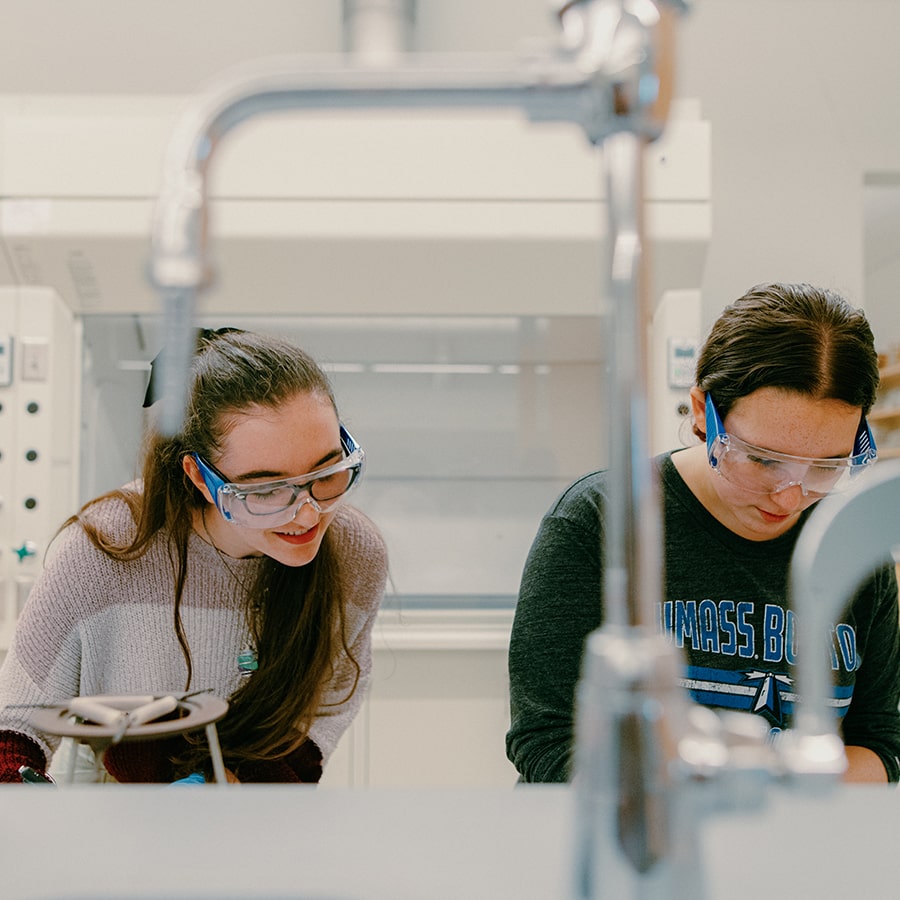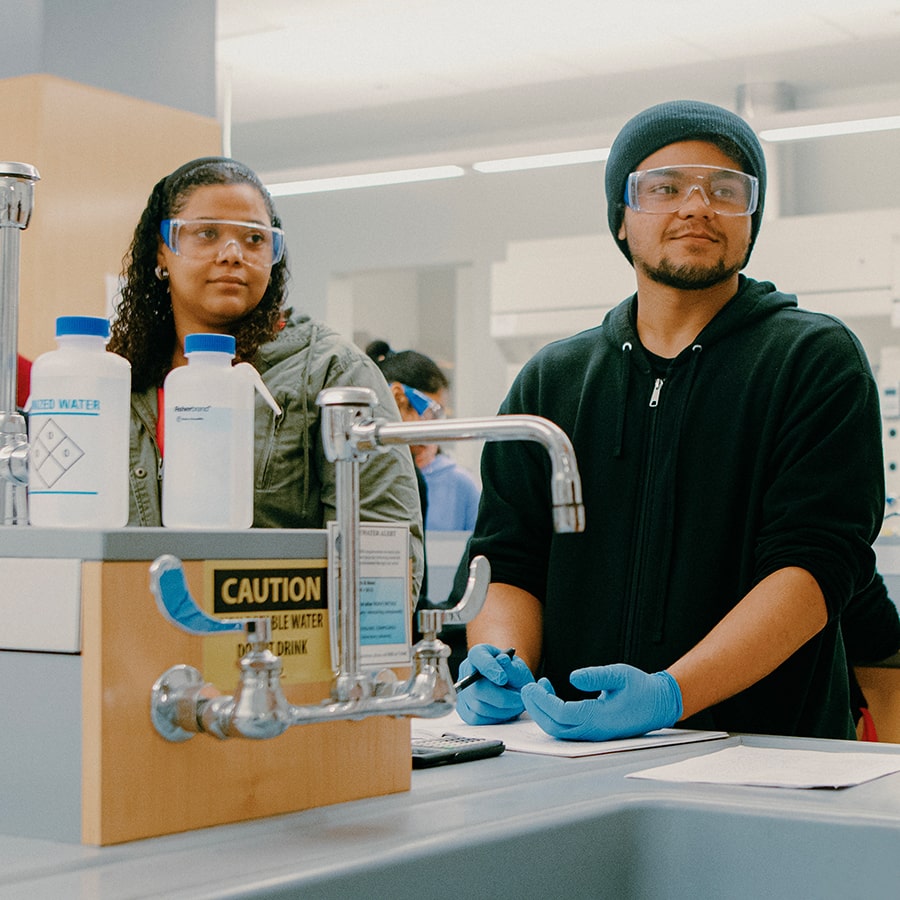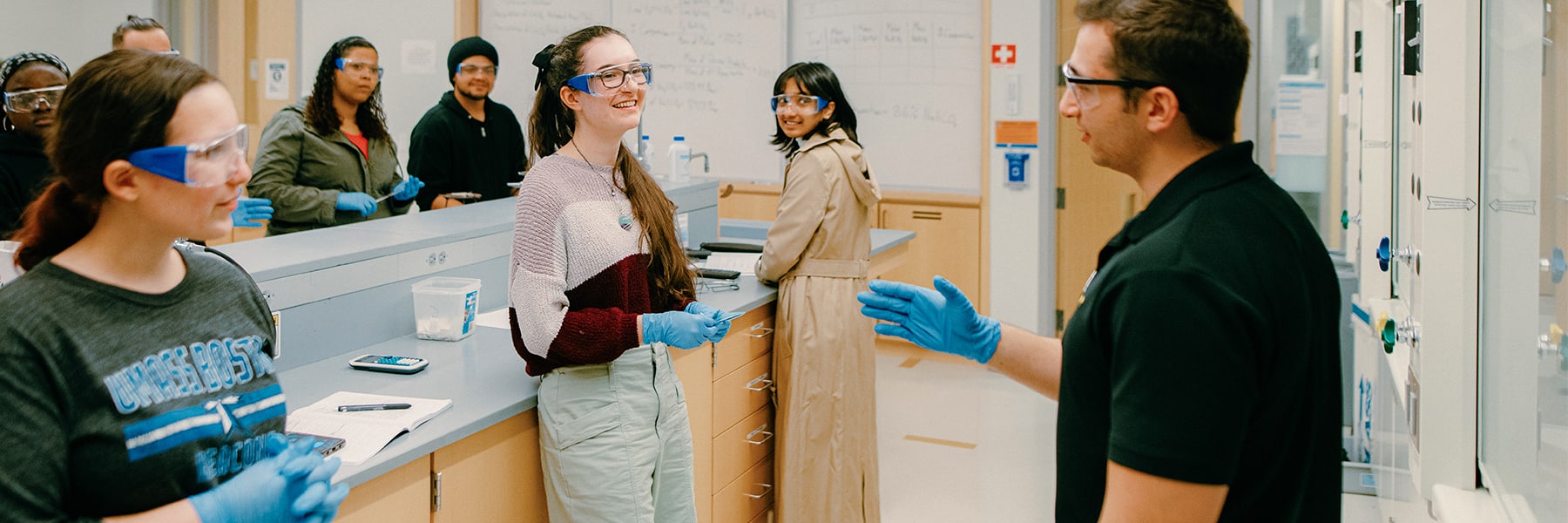Plan Your Education
How to Apply
Apply for Admission
Please review the first-year and transfer apply pages for important information about application requirements, deadlines, and application status check.
Deadlines & Cost
Early action deadline: November 1; Regular Decision Deadline: June 15
Financing Your Education
Become a Beacon and pursue your passion in UMass Boston’s diverse, supportive environment. Many students across our 200+ undergraduate and graduate programs receive financial aid—providing access to an education that’s exceptional and affordable. Click below to learn more about financial aid opportunities and deadlines.
Financial Aid Deadlines & Application Process
Scholarships for First-Year & Transfer Students
For additional information regarding tuition and fees, please visit the Bursar’s Office or send an email to Bursar@umb.edu.
Curriculum
Biology Core (40 to 45 Credits):
Complete 19 credits in biology and 21-26 credits in mathematics, physics, and chemistry.
- BIOL 111 - General Biology I 4 Credit(s)
- BIOL 112 - General Biology II 4 Credit(s)
- BIOL 210 - Cell Biology 4 Credit(s)
- BIOL 252 - Genetics 4 Credit(s)
- BIOL 290 - Population Biology 3 Credit(s)
- CHEM 115 - Chemical Principles I Lecture 3 Credit(s)
- CHEM 116 - Chemical Principles II Lecture 3 Credit(s)
- CHEM 117 - Chemical Principles I Laboratory 2 Credit(s)
- CHEM 118 - Chemical Principles II Laboratory 2 Credit(s)
- MATH 135 - Survey of Calculus 3 Credit(s)
or - MATH 140 - Calculus I 4 Credit(s)
or - MATH 145 - Calculus I for Life & Environmental Sciences 4 Credit(s)
- PHYSIC 107 - College Physics I 3 Credit(s)
or - PHYSIC 113 - Fundamentals of Physics I 4 Credit(s)
- PHYSIC 108 - College Physics II 3 Credit(s)
or - PHYSIC 114 - Fundamentals of Physics II 4 Credit(s)
- PHYSIC 171 - Introductory Physics Lab for Life Sciences I 1 Credit(s)
or - PHYSIC 181 - Physics Laboratory I 2 Credit(s)
- PHYSIC 172 - Introductory Physics Lab II for Life Sciences 1 Credit(s)
or - PHYSIC 182 - Physics Laboratory II 2 Credit(s)
Advanced Courses (20 credits):
Biology courses at the 300-level or higher, including a minimum of 4 credit hours in the laboratory. Biochemistry 383 through 386 are also acceptable. Up to 8 of these 20 credits may be taken from organic chemistry.
Students may also elect to declare a track in biotechnology, which will fulfill the advanced course requirements.
Advanced Biology:
Biology courses at the 300-level or higher except for: BIOL 444, 478, 479, 672, and 673
Biochemistry:
- BIOCHM 383 - Biochemistry I 3 Credit(s)
- BIOCHM 384 - Biochemistry II 3 Credit(s)
- BIOCHM 385 - Biochemistry Lab I 3 Credit(s)
- BIOCHM 386 - Biochemistry Lab II 3 Credit(s)
Organic Chemistry:
Note: Only one credit of each 2 credit organic chemistry lab (1 credit from CHEM 255 and 1 credit from CHEM 256) can be applied to the advanced level major lab credits.
- CHEM 251 - Organic Chemistry I Lecture 3 Credit(s)
- CHEM 252 - Organic Chemistry II Lecture 3 Credit(s)
- CHEM 255 - Organic Chemistry I Laboratory 2 Credit(s)
- CHEM 256 - Organic Chemistry II Laboratory 2 Credit(s)
Lab Courses:
Four laboratory courses are required and a minimum of two must be taken from within the BIOL department at UMass Boston.
- BIOL 306 - Marine & Coastal Ecological Research 3 Credit(s)
- BIOL 309 - Advanced Human Anatomy and Physiology I Lab 1 Credit(s)
- BIOL 310 - Advanced Human Anatomy and Physiology II Lab 1 Credit(s)
- BIOL 313 - Developmental Biology and Embryology 4 Credit(s)
- BIOL 316 - Neurobiology 4 Credit(s)
- BIOL 321 - Plant Physiology 4 Credit(s)
- BIOL 328 - Plant Life 4 Credit(s)
- BIOL 330 - Biology of Fishes 3 Credit(s)
- BIOL 334 - Microbiology 4 Credit(s)
- BIOL 337 - Comparative Animal Physiology 4 Credit(s)
- BIOL 338 - Insect Life 4 Credit(s)
- BIOL 343 - Ecology Laboratory 2 Credit(s)
- BIOL 345 - Ornithology Laboratory 1 Credit(s)
- BIOL 347 - Animal Behavior Laboratory 1 Credit(s)
- BIOL 353 - Evolution Laboratory 2 Credit(s)
- BIOL 356 - Introduction to Data Science for Biology Lab 1 Credit(s)
- BIOL 358 - Microbiome and Disease Ecology Research Lab 2 Credit(s)
- BIOL 361 - Bioinformatics Laboratory 1 Credit(s)
- BIOL 362 - Simulating Life 4 Credit(s)
- BIOL 365 - Microbial Genomics Laboratory 1 Credit(s)
- BIOL 370 - Molecular Biology 4 Credit(s)
- BIOL 378 - Introduction to Immunology 4 Credit(s)
- BIOL 391 - Survey of Human Physiology Lab 1 Credit(s)
- BIOL 478 - Independent Study 1-3 Credit(s)
or - BIOL 479 - Independent Study II 1-3 Credit(s)
- BIOCHM 385 - Biochemistry Lab I 3 Credit(s)
- CHEM 255 - Organic Chemistry I Laboratory 2 Credit(s)
- CHEM 256 - Organic Chemistry II Laboratory 2 Credit(s)
For more information on curriculum, including course descriptions and degree requirements, visit the Academic Catalog.
Learning Outcomes
Biology students will have gained understanding of the following concepts:
- Evolution: The diversity of life evolved by mechanisms driving genetic changes that are reflected in the tree of life.
- Information flow: The growth and behavior of organisms are activated through the expression of genetic information in context.
- Structure and function: Basic units of structure define the function of all living things.
- Pathways and transformation of matter and energy: Biological systems grow and change by processes based upon chemical reactions and are governed by the laws of thermodynamics.
- Systems: Living systems are interconnected and interacting; biological properties at one level provide directions and impose constraints on properties at other levels.
Biology students will have achieved the following competencies:
- Model: Construct, use, re-express, and revise models and representations of natural and designed objects, systems, phenomena, and scientific ideas in the appropriate context and in formulating their explanation.
- Apply quantitative reasoning: Reason about relationships between equations and variables through the lens of rates, percentages, probability, or proportional relationships when solving problems or when interpreting results or situations.
- Engage in argument from evidence: Evaluate the claims, evidence, or reasoning behind currently accepted explanations or solutions to determine the merits of arguments.
- Engage in scientific inquiry and experimental design: Design and conduct experiments with appropriate strategies, controls, and alternative approaches.
- Analyze and evaluate data: Extract information from data and analyze it to discover patterns, critically evaluate conclusions, and generate predictions for subsequent experiments.
- Appreciate and apply the interdisciplinary nature of science: Apply concepts from within biology subdisciplines and outside of biology to interpret biological phenomena.
- Written and oral scientific communication: Explore and express biological information using a range of tools and methods.
- Use an understanding of the process of science and knowledge of biology to engage with the world at large: Apply the results of scientific research to career, everyday life, society, health, and the environment.
Tracks
Biotechnology Track
Track Requirements:
Complete 31 credits from ten required courses.
Pass/fail: No more than one course taken pass fail may be applied toward the track.
Course Requirements:
Track Courses (31 Credits)
- BIOCHM 383 - Biochemistry I 3 Credit(s)
- BIOCHM 385 - Biochemistry Lab I 3 Credit(s)
- BIOL 334 - Microbiology 4 Credit(s)
- BIOL 370 - Molecular Biology 4 Credit(s)
- BIOL 378 - Introduction to Immunology 4 Credit(s)
- BIOL 395 - Biotechnology 3 Credit(s)
- CHEM 251 - Organic Chemistry I Lecture 3 Credit(s)
- CHEM 252 - Organic Chemistry II Lecture 3 Credit(s)
- CHEM 255 - Organic Chemistry I Laboratory 2 Credit(s)
- CHEM 256 - Organic Chemistry II Laboratory 2 Credit(s)
Related Minors
Biology Minor
Support your STEM career goals by supplementing your degree with a minor in biology.
Minor Requirements:
Complete a minimum of 20 credits from six courses including two general biology courses and four biology electives.
GPA: 2.0 required
Pass/fail: One course taken pass/fail may be applied toward the minor, provided all six minor courses are completed at UMass Boston.
Residency: At least three courses for the minor, including one at the 300-level or higher, must be completed at UMass Boston.
Course Requirements:
General Biology Courses (8 Credits)
- BIOL 111 - General Biology I 4 Credit(s)
- BIOL 112 - General Biology II 4 Credit(s)
200 Level or above Biology Courses (6 Credits)
Take two BIOL core courses (minimum 6 credits total) at the 200 level or above.
- BIOL 210 - Cell Biology 4 Credit(s)
or - BIOL 212 - Cell Biology (Lecture) 3 Credit(s)
- BIOL 252 - Genetics 4 Credit(s)
or - BIOL 254 - Genetics (Lecture) 3 Credit(s)
- BIOL 290 - Population Biology 3 Credit(s)
300-Level or above Biology Courses (6 Credits)
Take two BIOL courses (minimum 6 credits total) at the 300 level or above. BIOCHEM 383 can be used here.

Biology
Learn more about UMass Boston's Biology department, our research, and our faculty.
Explore the Department of Biology
College of Science & Mathematics
Learn more about the faculty, research, and programs that make up our College of Science and Mathematics.
Explore Now